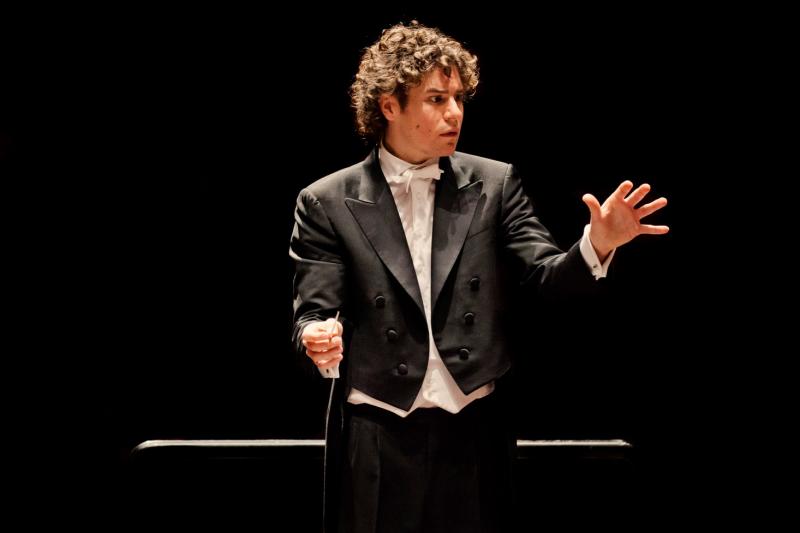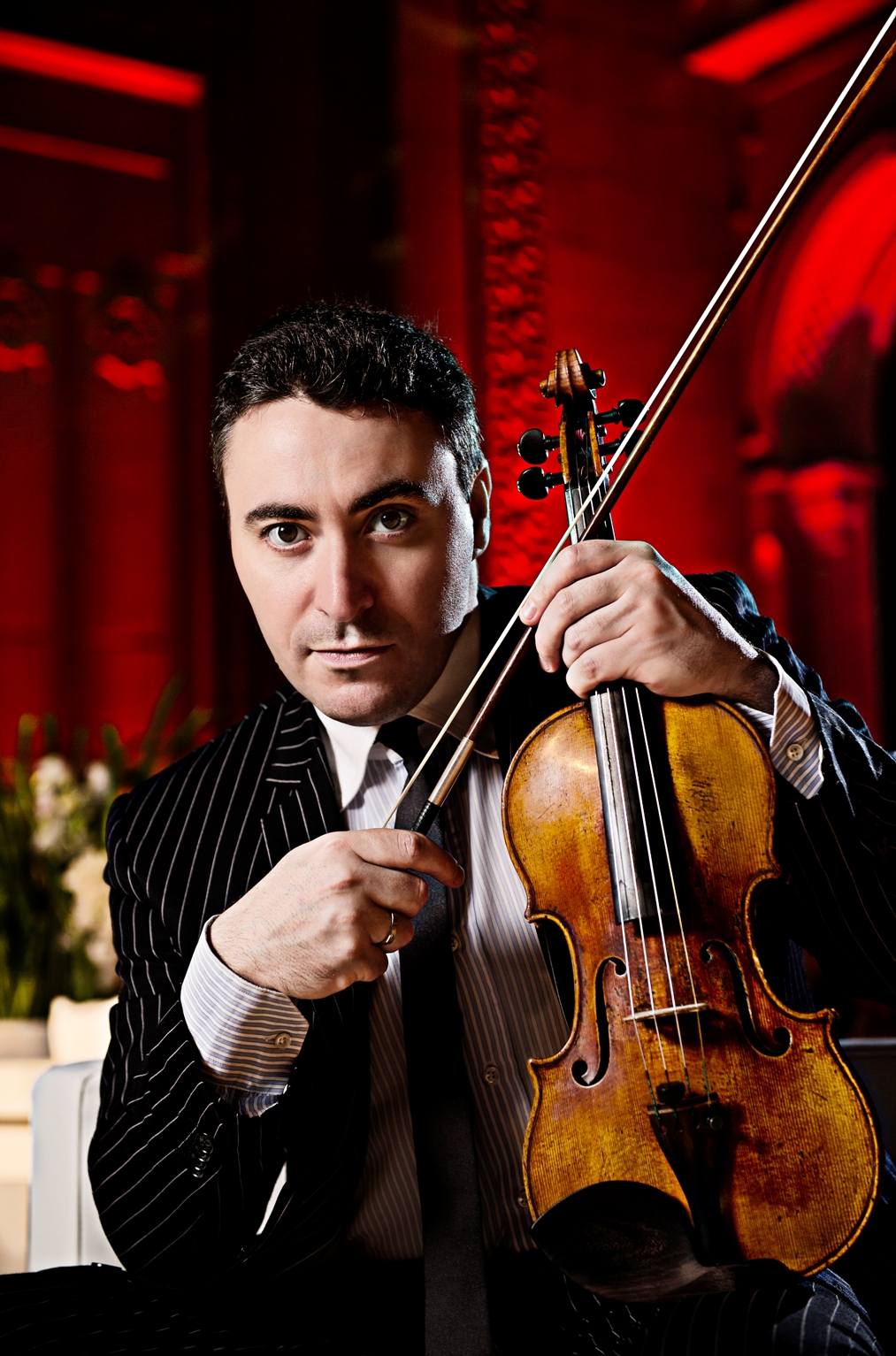Vengerov, London Symphony Orchestra, Ticciati, Barbican Hall | reviews, news & interviews
Vengerov, London Symphony Orchestra, Ticciati, Barbican Hall
Vengerov, London Symphony Orchestra, Ticciati, Barbican Hall
Youth gets a medal, Elgar's Enigma Variations reveal universal genius and a great violinist goes off piste

Her Majesty was making a rare concert-hall appearance to present the Queen’s Medal for Music, and any little Englanders in the audience might have been tempted to link royalty to Elgar’s Enigma Variations. But conductor Robin Ticciati, with a generosity and wisdom beyond his 29 years, raised this orchestral masterpiece to the universal level it deserves. Elgar’s "friends pictured within" trod air and revealed every aspect of their often shy, beautiful souls.
It should come as no surprise that the score transcends labels of nationality, provinciality even. After all, what is "Nimrod" but the portrait of a German, August Jaeger, based on music by a German (the slow movement of Beethoven’s “Pathétique” Piano Sonata)? Ticciati and an LSO on supremely supple form left us in no doubt that it captures the span of a great symphonic Adagio in a matter of minutes, landing on each reiteration of its familiar variation-tune as the movement builds with a miraculous sense of space. This is what already makes Ticciati a great conductor – his infallible instinct for tempo rubato, of the free but never loose phrasing which, alongside refinements of orchestration, gives Elgar his special warmth and personality.
Dissolve the traces of Max’s more familiar acid and essentially the tunes sound more like vague doodles
For that reason, the variations either side of "Nimrod" were just as wonderful in their different ways: the graciousness of "Winifred Norbury" arching in heartfelt lines effortlessly shared between strings and woodwind, the light embroidery of "Dorabella" given a touch of Puck-like waspishness in the muted violins’ fantasy darts. Between well-timed bouts of boisterousness, other characters came to life through human song, culminating in the cellos’ great aria in Variation XII - all expressive stops pulled out when the violins join them – and the inner pain of parting when a barely audible solo clarinet (Andrew Marriner) meditates on a calm sea and the timpani, even more on the cusp of silence, throb like a ship’s engine.
This was the great event of a curious evening. Equalling it in importance, and a rapturous reception, was the revelation of the medal recipient – not, as previously, an individual, but a collective national treasure and world-class team to shout about, the 64-year old National Youth Orchestra. Apt, then, that Ticciati should have once been a member, and that the recuperating Sir Colin Davis, whom he was replacing, has been so closely associated with some of the NYO’s many finest concerts. It was an inspired touch, too, to give five sharers in the award, headed by leader Roberto Ruisi, places among the LSO strings for the Enigma performance.
 The prizegiving was introduced by Sir Peter Maxwell Davies, who still seems like an unlikely Master of the Queen’s Music. He’d written an appropriately big and noisy new fanfare, Her Majesty’s Welcome, along the lines of Richard Strauss’s more elongated festive pieces. Dissolve the traces of Max’s more familiar acid, though, and essentially the tunes sound more like vague doodles. Wouldn’t it make better sense to appoint a more populist but still superior melody-maker like Carl Davis to the royal post? Anyway, the real point of this was to involve young wind and brass players from the London boroughs participating in the LSO’s On Track scheme, and very splendid they sounded in the company of their counterparts in the orchestra.
The prizegiving was introduced by Sir Peter Maxwell Davies, who still seems like an unlikely Master of the Queen’s Music. He’d written an appropriately big and noisy new fanfare, Her Majesty’s Welcome, along the lines of Richard Strauss’s more elongated festive pieces. Dissolve the traces of Max’s more familiar acid, though, and essentially the tunes sound more like vague doodles. Wouldn’t it make better sense to appoint a more populist but still superior melody-maker like Carl Davis to the royal post? Anyway, the real point of this was to involve young wind and brass players from the London boroughs participating in the LSO’s On Track scheme, and very splendid they sounded in the company of their counterparts in the orchestra.
Sellout guarantee for this event had been assured, long before its medal-giving status had been decided, by the presence of Russian violin royalty Maxim Vengerov (pictured above right by Naim Chidiak) in the Tchaikovsky Violin Concerto. Despite the expected charisma and the opulent, dark tones of Vengerov’s Stradivarius, the first movement turned out to be a scary ride. Tchaikovsky’s natural flow of inspiration was strenuously freighted, and Vengerov went off piste at several points, badly so near the start of the cadenza. Ticciati and the LSO seemed to be as flexibly alert to the dangers as they could be, but what can you do when the soloist doesn’t appear to be interacting with his fellow players?
Tchaikovsky’s Canzonetta restored some of the old Vengerov magic in introspective song, and more clarinet soulfulness embroidered the reprise, while the finale, taken at a furious vivacissimo, was probably worth the one near-derailment when our violinist left the poor horn trailing. The Bach encore was poised, but didn’t quite draw me in as a solo violin can so hauntingly do in a big hall. Vengerov's unique, no doubt about it, but these days he needs to listen to his orchestra: that, after all, is what would have made for a concerto partnership worthy to sit alongside the Elgar. In the light of which it will probably be a case of arise, Sir Robin in a decade or so.
rating
Share this article
The future of Arts Journalism
You can stop theartsdesk.com closing!
We urgently need financing to survive. Our fundraising drive has thus far raised £33,000 but we need to reach £100,000 or we will be forced to close. Please contribute here: https://gofund.me/c3f6033d
And if you can forward this information to anyone who might assist, we’d be grateful.

Subscribe to theartsdesk.com
Thank you for continuing to read our work on theartsdesk.com. For unlimited access to every article in its entirety, including our archive of more than 15,000 pieces, we're asking for £5 per month or £40 per year. We feel it's a very good deal, and hope you do too.
To take a subscription now simply click here.
And if you're looking for that extra gift for a friend or family member, why not treat them to a theartsdesk.com gift subscription?
more Classical music
 Bach St John Passion, Academy of Ancient Music, Cummings, Barbican review - conscience against conformism
In an age of hate-fuelled pile-ons, Bach's gospel tragedy strikes even deeper
Bach St John Passion, Academy of Ancient Music, Cummings, Barbican review - conscience against conformism
In an age of hate-fuelled pile-ons, Bach's gospel tragedy strikes even deeper
 MacMillan St John Passion, Boylan, National Symphony Orchestra & Chorus, Hill, NCH Dublin review - flares around a fine Christ
Young Irish baritone pulls focus in blazing performance of a 21st century classic
MacMillan St John Passion, Boylan, National Symphony Orchestra & Chorus, Hill, NCH Dublin review - flares around a fine Christ
Young Irish baritone pulls focus in blazing performance of a 21st century classic
 First Person: St John's College choral conductor Christopher Gray on recording 'Lament & Liberation'
A showcase for contemporary choral works appropriate to this time
First Person: St John's College choral conductor Christopher Gray on recording 'Lament & Liberation'
A showcase for contemporary choral works appropriate to this time
 Classical CDs: Romance, reforestation and a Rolleiflex
New music for choir, orchestra and string quartet, plus a tribute to a rediscovered photographer
Classical CDs: Romance, reforestation and a Rolleiflex
New music for choir, orchestra and string quartet, plus a tribute to a rediscovered photographer
 Donohoe, RPO, Brabbins, Cadogan Hall review - rarely heard British piano concerto
Welcome chance to hear a Bliss rarity alongside better-known British classics
Donohoe, RPO, Brabbins, Cadogan Hall review - rarely heard British piano concerto
Welcome chance to hear a Bliss rarity alongside better-known British classics
 London Choral Sinfonia, Waldron, Smith Square Hall review - contemporary choral classics alongside an ambitious premiere
An impassioned response to the climate crisis was slightly hamstrung by its text
London Choral Sinfonia, Waldron, Smith Square Hall review - contemporary choral classics alongside an ambitious premiere
An impassioned response to the climate crisis was slightly hamstrung by its text
 Goldberg Variations, Ólafsson, Wigmore Hall review - Bach in the shadow of Beethoven
Late changes, and new dramas, from the Icelandic superstar
Goldberg Variations, Ólafsson, Wigmore Hall review - Bach in the shadow of Beethoven
Late changes, and new dramas, from the Icelandic superstar
 Mahler's Ninth, BBC Philharmonic, Gamzou, Bridgewater Hall, Manchester review - vision and intensity
A composer-conductor interprets the last completed symphony in breathtaking style
Mahler's Ninth, BBC Philharmonic, Gamzou, Bridgewater Hall, Manchester review - vision and intensity
A composer-conductor interprets the last completed symphony in breathtaking style
 St Matthew Passion, Dunedin Consort, Butt, Queen’s Hall, Edinburgh review - life, meaning and depth
Annual Scottish airing is crowned by grounded conducting and Ashley Riches’ Christ
St Matthew Passion, Dunedin Consort, Butt, Queen’s Hall, Edinburgh review - life, meaning and depth
Annual Scottish airing is crowned by grounded conducting and Ashley Riches’ Christ
 St Matthew Passion, Irish Baroque Orchestra, Whelan, St Patrick’s Cathedral, Dublin review - the heights rescaled
Helen Charlston and Nicholas Mulroy join the lineup in the best Bach anywhere
St Matthew Passion, Irish Baroque Orchestra, Whelan, St Patrick’s Cathedral, Dublin review - the heights rescaled
Helen Charlston and Nicholas Mulroy join the lineup in the best Bach anywhere
 Kraggerud, Irish Chamber Orchestra, RIAM Dublin review - stomping, dancing, magical Vivaldi plus
Norwegian violinist and composer gives a perfect programme with vivacious accomplices
Kraggerud, Irish Chamber Orchestra, RIAM Dublin review - stomping, dancing, magical Vivaldi plus
Norwegian violinist and composer gives a perfect programme with vivacious accomplices
 Small, Hallé, Wong, Bridgewater Hall, Manchester review - return to Shostakovich’s ambiguous triumphalism
Illumination from a conductor with his own signature
Small, Hallé, Wong, Bridgewater Hall, Manchester review - return to Shostakovich’s ambiguous triumphalism
Illumination from a conductor with his own signature

Add comment